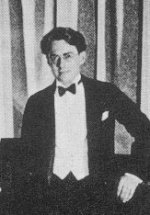Cavalcade of America

Musical director Donald Voorhees (1935-41, 1949-53)
|
|
| Genre | Anthology drama |
|---|---|
| Running time | 25 minutes |
| Country | United States |
| Language(s) | English |
| Home station |
CBS (10/09/35-05/29/39) NBC (01/02/40-03/31/53) |
| TV adaptations | NBC (10/01/52-09/02/53) ABC (09/29/53-06/21/55) ABC (09/06/55-06/04/57) |
| Hosted by | Walter Huston (09/18/44-02/12/45) |
| Starring | Numerous Broadway and Hollywood stars |
| Created by | Roy Durstine |
| Written by |
Arthur Miller Norman Rosten Robert Tallman Peter Lyon Robert Richards Stuart Hawkins Arthur Arent Edith Sommer Halsted Welles Henry Denker Priscilla Kent Virginia Radcliffe Frank Gabrielson Margaret Lewerth Morton Wishengrad George Faulkner Irve Tunick |
| Directed by |
Robert Stevenson (director) Laslo Benedek Peter Godfrey (director) John Brahm William A. Seiter Harry Horner Kenneth Webb Homer Fickett Bill Sweet Homer Fickett Jack Zoller |
| Produced by | Arthur Pryor Louis Mason Larry Harding Homer Fickett Jack Zoller Roger Pryor H.L. Blackburn |
| Air dates | October 9, 1935 to March 31, 1953 |
| No. of series | 18 |
| No. of episodes | 781 |
| Audio format | Monaural sound |
| Opening theme | "March Theme" "Glory of America" |
Cavalcade of America is an anthology drama series that was sponsored by the DuPont Company, although it occasionally presented musicals, such as an adaptation of Show Boat, and condensed biographies of popular composers. It was initially broadcast on radio from 1935 to 1953, and later on television from 1952 to 1957. Originally on CBS, the series pioneered the use of anthology drama for company audio advertising.
Cavalcade of America documented historical events using stories of individual courage, initiative and achievement, often with feel-good dramatizations of the human spirit's triumph against all odds. The series was intended to improve DuPont's public image after World War I. The company's motto, "Maker of better things for better living through chemistry," was read at the beginning of each program, and the dramas emphasized humanitarian progress, particularly improvements in the lives of women, often through technological innovation.
The show started as part of a successful campaign to reinvigorate DuPont. In the early 1930s, the Nye Committee investigations concluded that DuPont had made a fortune profiteering in World War I. The company stood accused of encouraging an arms race between World War I enemies, after being heavily subsidized by the Allies to increase black powder production. The negative effects of the investigation left the company demoralized, directionless and with a tarnished corporate image in the middle of the Great Depression.
DuPont's products were primarily not for public consumption, so there was no purpose in promoting them through advertising. As a solution to DuPont's troubles, Roy Durstine, then creative director of Batten, Barton, Durstine & Osborn, proposed the creation of Cavalcade of America using the company motto. This was to be an important element in the successful re-branding of DuPont as an American legacy engaged in making products for the well-being of Americans and humanity in general.
...
Wikipedia
